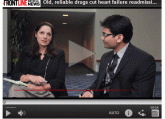WASHINGTON – Patients with acute heart failure who were discharged on an angiotensin converting enzyme inhibitor or an angiotensin receptor blocker were significantly less likely to be readmitted to the hospital within 30 days of discharge than patients who were not prescribed these drugs, in a retrospective study of Medicare beneficiaries.
Using data from the Alabama Heart Failure Project, the study looked at hospital readmission rates in 1,348 patients with acute decompensated heart failure and an ejection fraction under 45%, discharged from 106 hospitals in the United States. Their mean age was 75 years, they had similar renal function, they were on various baseline cardiac medications, and they had no contraindications for angiotensin converting enzyme (ACE) inhibitor or angiotensin receptor blocker (ARB) treatment. Of these patients, 734 were prescribed one of these drugs before discharge.
The heart failure readmission and all-cause mortality rates were significantly higher among those who were not started on an ACE inhibitor or ARB before discharge: The 30-day heart failure readmission rate was 14% among those who did not receive an ACE inhibitor or ARB, compared with 7% of those who did – a 48% reduced risk, said Dr. Kumar Sanam, a heart failure fellow at the University of Alabama, Birmingham, at the annual meeting of the American College of Cardiology.
The all-cause readmission rate within 30 days among patients discharged without an ACE inhibitor or ARB was also significantly higher, at 24%, compared with 18% of those discharged with an ACE or an ARB, a relative risk reduction of 26%. The risk of all-cause mortality was reduced by 44% among those prescribed an ACE inhibitor or ARB, Dr. Sanam said.
Under the Affordable Care Act, hospitals will be penalized for above-average, all-cause 30-day readmission rates, he noted, and these findings highlight how the use of treatment recommended in evidence-based guidelines "could be used to reduce a costly health care problem," in the United States, Dr. Sanam said. An estimated one in four patients hospitalized with heart failure return to the hospital within 30 days, and heart failure is the most common cause of 30-day all-cause readmissions, he noted.
Dr. Sanam had no disclosures.
emechcatie@frontlinemedcom.com
